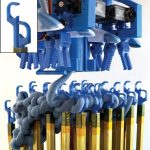Sweat-powered sticker could turn your coffee cup into a health tracker
Imagine checking your vitamin levels just by holding your morning coffee or orange juice—no needles, no batteries, and no extra effort.
Engineers at the University...
New camera lens can keep everything in focus— from inches away to infinity
Imagine taking a photo where every single detail—from the flower right in front of your lens to the mountains far in the distance—is crystal...
“Living metal” could connect electronics and biology like never before
Scientists at Binghamton University are developing a remarkable new material they call “living metal”—a combination of metal and bacterial spores that could one day...
Tiny neural implant smaller than a grain of salt can track brain activity for...
Scientists have created a brain implant so small it can sit on a grain of salt—yet powerful enough to wirelessly record brain activity for...
AC power revolutionizes tiny LEDs for next-generation VR and AR displays
A team of scientists in China has discovered a new way to power nano-sized LEDs, paving the path for more compact, energy-efficient, and high-resolution...
This knitting machine works like a 3D printer to create solid objects
Knitting may seem like an ancient craft, but researchers at Cornell University and Carnegie Mellon University have reimagined it for the future—by turning it...
Scientists achieve record 31% efficiency in red quantum LEDs for next-gen screens
A team of engineers at the Hong Kong University of Science and Technology (HKUST) has achieved a major breakthrough in display technology by developing...
Scientists create self-healing, flexible polymer for next-generation wearable electronics
Imagine a flexible electronic device that can bend, stretch, and even repair itself when damaged. Scientists in Japan have now made a major step...
Is your 8K tv a waste of money? Scientists find the true resolution limit...
If you’ve ever wondered whether buying that ultra-expensive 8K television is worth it, scientists now have an answer: probably not.
A new study by researchers...
Battery-powered kitchen stove makes going electric easier than ever
Switching from gas to electric cooking just got much simpler, thanks to a new battery-equipped kitchen range developed by the startup Copper, founded by...









